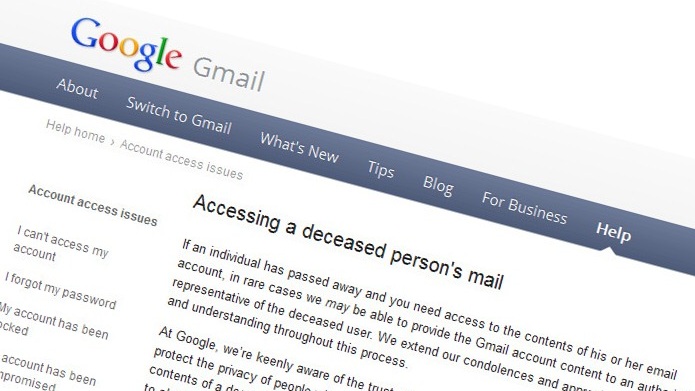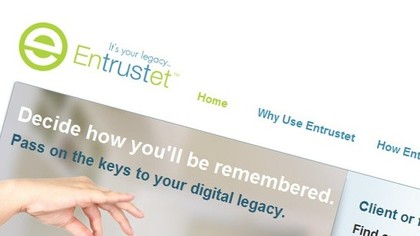What happens to your web stuff when you die?
Ensure your profiles and pics stay up if you pop your clogs

For all its joys, technology can't yet make us live forever - but if we want it to, it can ensure our digital footprints remain online long after we've shuffled off this mortal coil.
Things have changed quite considerably in the last few years as the digital generation has grown up, grown old and in some cases, died: sites that didn't really think about their customers dying, such as Facebook now have policies and procedures in place to memorialise the dead.
Facebook is arguably the most important site for remembering people, as it's where hundreds of millions of us connect with family and friends online. In the event of somebody's death, their relatives can use a form to ask Facebook to "memorialise" their page.
This changes the way the deceased person's page works, so it will no longer be available to anyone who wasn't already a Facebook friend of that person and it no longer turns up in search results. While friends and family can leave "posts in remembrance," the account itself is locked down and cannot be modified.
As with most online services, Facebook accounts can also be shut down altogether when somebody dies, although to do that you'll need to provide official documentation such as a death certificate.
Services such as Flickr and Windows Live have similar processes in place, and in the case of Windows Live Microsoft has a defined Next of Kin Process that also enables verified family members to access the deceased's Hotmail and Messenger contact lists as well as to shut the accounts down. Google has a similar process for Gmail accounts.
Keeping your stuff online
What happens if you don't want your accounts to expire? The short answer is "it depends".
Get daily insight, inspiration and deals in your inbox
Sign up for breaking news, reviews, opinion, top tech deals, and more.
Many services have inactivity polices that suspend or remove accounts that appear to be unused - for example, Twitter monitors " a combination of tweeting, logging in, and the date an account was created" - and anything reliant on a domain name that you own has a built-in time limit: in most cases, domains are registered for a period of two years, and if you don't renew them then the domains go back on the market.
And of course, paid-for web hosting and other online storage services only last for as long as the bills are being paid.
Not all paid-for accounts are deleted if you stop paying, though: in the case of paid-for Flickr Pro accounts, if you aren't around to renew the subscription, your account simply reverts to a standard, free account - which means that some of your sets and high-res images may no longer be visible to visitors, but sets and images aren't deleted.
If the account is upgraded again to a Pro account, the 'missing' images will reappear. It's worth pointing out, however, that Flickr accounts are non-transferable, so a relative accessing your account is technically in breach of Yahoo's terms and conditions.
Some other things aren't transferable, either: your iTunes music collection, for example, or your Kindle ebook library. With digital goods you pay for a licence to use the content rather than ownership of the content, and such licenses are usually non-transferable.
We very much doubt that any firm would be nasty enough or dumb enough to actively try and stop bereaved relatives from listening to your purchased music, watching your movies or reading your books, but if you want to pass on your digital media then it's a very good idea to pass on your login details or convert everything into DRM-free formats while you're still around.
Where there's a will...
If you're serious about keeping your online presence going, you should think about a digital will and an executor, somebody who can handle your affairs when you're gone. The executor will need your various login details, of course, and if there's stuff on your computer or online services you'd rather the family didn't see you can always ask the executor to delete specific content.
Inevitably there are companies who will handle this for you for a fee, but there's no reason why you can't put digital details in an ordinary will or just have a big envelope marked "to be open in the event of my death" in a place where your relatives will find it. If part of your wishes involve spending money - keeping paid-for accounts going, renewing domain names and so on - then it would be polite to leave some cash for that too.

If all else fails, there's always the Internet Archive. It won't archive your Flickr pics or password-protected content, but it does a decent job of archiving publicly available web pages. If your site isn't already in the index, you can add it via Alexa.
We might not live forever, but some of our online stuff might.
Writer, broadcaster, musician and kitchen gadget obsessive Carrie Marshall has been writing about tech since 1998, contributing sage advice and odd opinions to all kinds of magazines and websites as well as writing more than a dozen books. Her memoir, Carrie Kills A Man, is on sale now and her next book, about pop music, is out in 2025. She is the singer in Glaswegian rock band Unquiet Mind.
